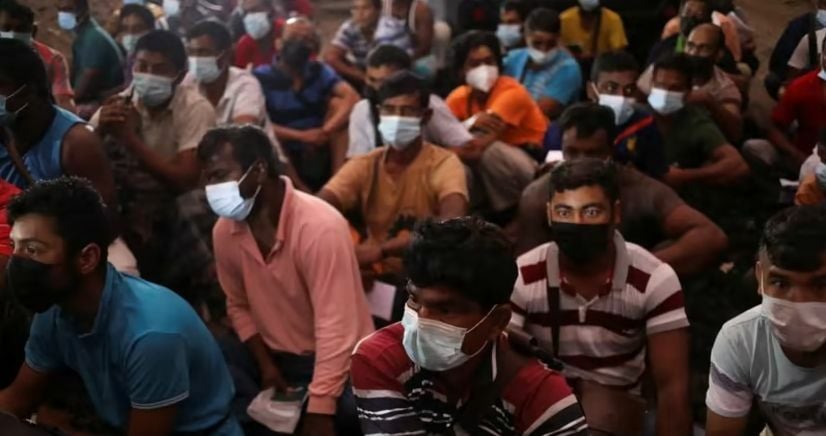Malaysia’s human resource ministry corruption probe presents opportunity for migrant worker system reform

The ongoing investigation into Malaysia’s Human Resource Ministry over allegations of corruption in foreign workers’ recruitment has cast a shadow on Prime Minister Anwar Ibrahim’s government, which came to power after the November 2022 general election on an anti-graft platform. Officers from the Malaysian Anti-Corruption Commission (MACC) have arrested three senior government officials connected to the Human Resource Minister Sivakumar’s office, and Sivakumar was also asked to provide the MACC with a statement.
Since then, Anwar has directed the dismissal of five officers from the Human Resource Ministry involved in the ongoing investigation but has rejected calls from the opposition demanding Sivakumar’s removal from the Cabinet. Anwar has been quoted as saying that unless the MACC finds evidence implicating the minister directly, there is no reason for him to vacate his position reports Channel News Asia.
The corruption probe has presented Anwar with a chance to bring about reforms at the Human Resource Ministry, particularly in the country’s controversial and opaque migrant worker recruitment system that has long attracted corruption.
Malaysia, an export-dependent nation, relies on millions of migrant workers to fill positions in plantation, factory, and service sector jobs. The Department of Statistics states that there are 2.1 million documented foreign workers in Malaysia as of June 2022. The undocumented worker population is, like in any other country, impossible to determine, but the International Organization for Migration places the number as high as 4 million. Together, the migrant worker group makes up approximately 30% of Malaysia’s workforce.
However, the migrant labor system has faced accusations of collusion between politicians, enforcement agencies, recruitment firms, labor brokers, and exploitative employers, as well as forced labor and terrible living conditions. The US State Department has consistently listed Malaysia alongside China and North Korea for making limited progress in eradicating labor trafficking, resulting in export bans on products from the country.
“The government is in a unique position to bring a sledgehammer to the current system that is riddled with corruption and has created something that closely resembles some form of modern human slavery,” says Charles Santiago, a three-term former MP and one of Malaysia’s most prominent campaigners pushing for reform in the recruitment of foreign workers.
Since the early 1990s, Malaysia has been recruiting workers from several countries, beginning with Indonesia and the Philippines, before attracting labor from countries such as Myanmar, Vietnam, Nepal, and India. Nevertheless, it is Malaysia’s recruitment of Bangladeshi workers that continues to draw the most criticism and allegations of corruption.
Exporting labor is a big business in Bangladesh, and the connections between the players controlling the foreign recruitment chain in both countries are robust. Over 1,300 registered agents reportedly operate in Bangladesh, and the larger players among them have operations in Malaysia that directly deal with a private entity called Bestinet Sdn Bhd. Bestinet secured exclusive rights in 2013 to operate a foreign worker management system that oversees the movement of workers into Malaysia.
A recruit commonly pays around RM20,000 (US$4,500) to the various players in the complicated recruitment process. The steep fee is mostly paid through loans, immediately locking workers into debt bondage that can only be paid off by working long hours and accepting poor living conditions.
A government-appointed task force set up in 2018 to review foreign worker management found that the entire system was fraught with mismanagement and corruption. Recommendations for a comprehensive overhaul to the Bestinet-managed Foreign Workers Centralised Management System were overshadowed by Malaysia’s subsequent political upheaval, which saw the change of three administrations before Anwar took power in November.
Santiago and other labor reform activists note that the trade is highly lucrative, amounting to several billion dollars annually. “The country is paying too high a price, and nothing short of bringing down the current opaque system and replacing it with a more transparent, straightforward process to recruit workers is needed,” Santiago added.
However, cracking down on Bestinet could prove to be politically challenging for Anwar due to the company’s alleged links with Deputy Prime Minister Ahmad Zahid Hamidi. Press reports have connected Bestinet to Hamidi, who faces charges of alleged corruption in a company involved in providing visas to Nepali workers and tourists from China. Both parties have denied any direct business ties, but political sources note that Bestinet’s major shareholder, Mohamed Amin Abdul Nor, and Hamidi maintain a warm relationship.
Labor reform advocates like Santiago recommend that the government establish a new agency under the Prime Minister’s Office to handle the entire recruitment process transparently while minimizing input from private labor brokers. “A new agency could take as long as one year to get up and running. We need to start somewhere,” Santiago noted.
Taking action against the migrant labor recruitment system will send a clear message that Anwar is serious about implementing reforms, but it will not be easy and will require significant political will. Anwar’s coalition government is constantly grappling with challenges from Malaysia’s spirited opposition. Taking on powerful and entrenched interest groups that control the foreign labor management system will add to his political woes.
Latest Thailand News
Follow The Thaiger on Google News:


























